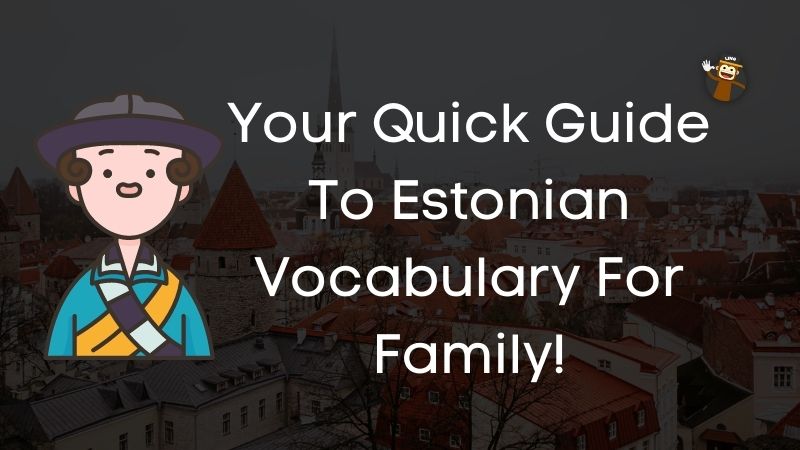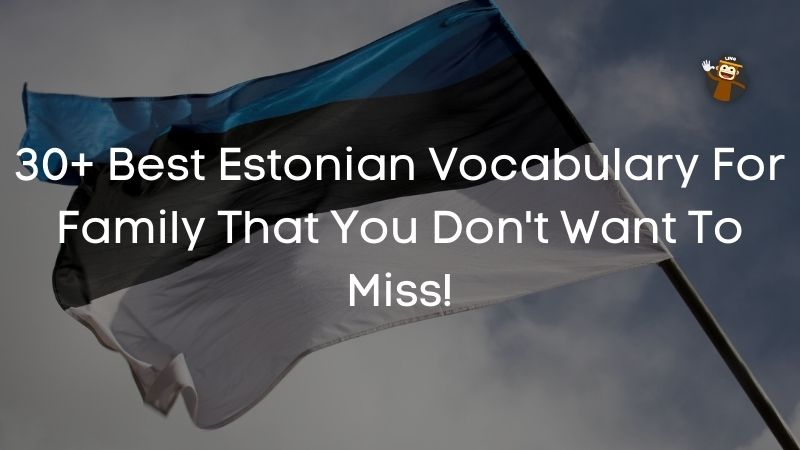Are you planning to learn Estonian? Start by learning Estonian vocabulary for family! These family words are a great way to begin your Estonian language journey.
Learning Estonian vocabulary is not only a great way to improve your language skills, but it can help you as you take on more Estonian lessons in the future.
Here’s What You Should Know!
Learning a new language is definitely one of the hardest goals someone can take on. As soon as you start taking courses and talking to native speakers, it can all become overwhelming very fast. But, learning a new language is also extremely rewarding.
So, keep reading to learn more about family members and how these terms are translated into Estonian!

Keep in Mind!
These are just some of the words about family members in Estonian that you might want to keep in mind if you decide to learn the Estonian language in the long run. Aside from that, if you plan on living or even visiting the country, it is definitely encouraged and nice to know a couple of words of the language to avoid miscommunication.
Knowing these words will be really helpful when it comes to talking with Estonians and making relationships with other people. While learning a language can be hard sometimes, especially when you don’t know where to start, it’s always best to try to build your vocabulary as much as you can!
Estonian Vocabulary For Family Used In Sentences
Aside from knowing how these family words are translated into Estonian, it is also important to know how such words should be used in sentences.

Take a look at some of our example sentences below!
| English | Estonian |
| My daughter and husband went to town yesterday because they wanted to surprise my mother with a very special birthday gift. | Mu tütar ja abikaasa käisid eile linnas, sest nad tahtsid mu ema üllatada väga erilise sünnipäevakingiga. |
| The children of my brother are always staying in my house because he and his wife are always very busy with work. | Mu venna lapsed on alati minu majas, sest tema naine ja tema on alati tööga väga hõivatud. |
| Parents tend to have a very protective instinct when it comes to their children. Luckily, I grew up in a family with lesser rules and relatives that have always supported me. | Vanematel on oma lastega seoses tavaliselt väga kaitsev instinkt. Õnneks kasvasin üles peres, kus kehtivad väiksemad reeglid ja sugulased, kes mind alati toetavad. |
| Her son was always called to the principal’s office for displaying bad behavior in class. | Tema poeg kutsuti alati direktori kabinetti, sest ta tundis alati halvasti. |
| Our relatives and my family always celebrate Christmas together so that our children will grow up in a very close-knit family. | Meie sugulased ja minu pere tähistavad jõule alati koos, et meie lapsed kasvaksid väga ühtehoidvas peres. |
| My sister and I promised each other that we would still go on vacations during the holidays even if we are busy with work. | Lubasime õega teineteisele, et läheme puhkuse ajal ikka puhkama ka siis, kui oleme tööga hõivatud. |
| His daughter was always top of her class, which is why she got admitted into a very good university. | Tema tütar oli alati oma klassi tipptasemel, mistõttu ta pääses väga heasse ülikooli. |
| My father loves to cook for the family and so whenever we have a special occasion, our house always hosts the party. | Mu isa armastab perele süüa teha ja nii et kui meil on mõni eriline sündmus, korraldatakse meie majas alati pidusid. |
| Her daughter and son surprised her with a golden necklace on a random day to show their appreciation. | Tütar ja poeg üllatasid teda juhuslikul päeval kuldse kaelakeega, et avaldada tunnustust. |
| Both families agreed on a church wedding this June because it’s more convenient. | Mõlemad pered leppisid tänavu juunis kokku kirikliku laulatuse, sest nii on mugavam. |
These are just a few sentences that feature Estonian vocabulary for family. But, of course, there are so many more to learn!
This Is Why You Should Learn Estonian!
While some people think that being able to teach yourself Estonian is hard, it will definitely make your life easier if you find yourself living in Estonia or if you have a lot of Estonian friends.
Learning Estonian is great, not just because it’s a very interesting language, but it can help you connect with locals and make your experience in Estonia that much more worthwhile!
Learn Estonian With The Ling App!
Want to learn more Estonian? Better do it with the Ling App!
The Ling App is a language learning application that enables you to learn a new language while having fun. This language learning platform – which offers lessons in over 60 languages – is a great way to get you started in achieving all your language goals!

Through Ling’s gamified lessons, helpful grammar tips, and so much more, learning a new language becomes effective, enjoyable, and easier. To make things even more convenient, the app is available in the App Store, Google Play, and in a desktop version.
Download and check out the Ling App to discover a fun way to learn your next language lesson!






























































